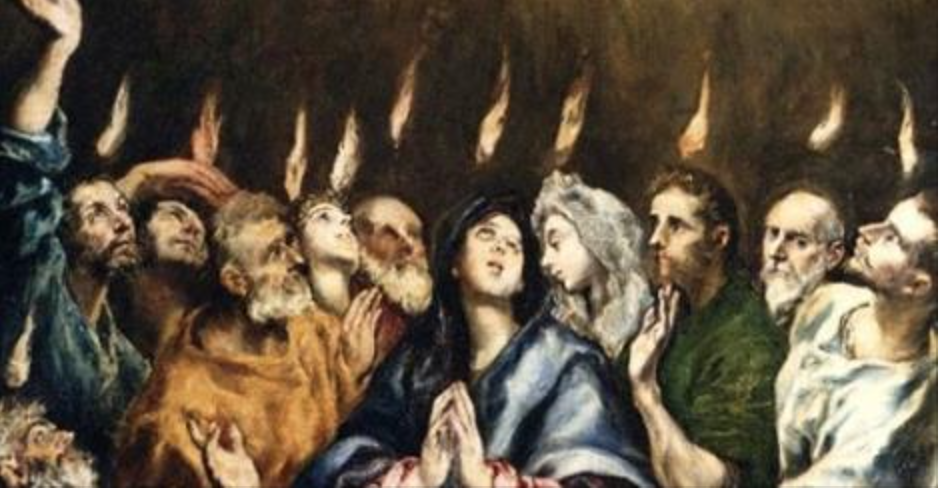I was thinking about the obvious allusions to the aspect of Pentecost where the event of Babel was reversed temporarily. We have always been reaching out to God, but choosing our own path to get closer. It is often only on our own terms that we build up edifices to become closer to heaven. Becoming builders on our own efforts.
In the Incarnation, Jesus instead reduces this distance by coming down to us. Living among us, teaching us, revealing the mystery of the Trinity and that our conceptions of God, no matter how grand, pale against the revealed truth of the Divine persons of the Godhead. God loves us so much that he allows us to struggle to conceptualize this. We would misunderstand this in so many ways when trying to simplify it to human experience, multiplying heresies. A revealed truth, such as the inner life of the Most Holy Trinity, requires an intellectual effort that will never result in full understanding. Yet, this is so fruitful that we can continually dive into mystery.
A prominent miracle at Pentecost was that of communication and understanding. Actual communication and understanding is still as rare of miracle as it was on that day. Often we are not seeking the truth, but a narrative that reinforces our perceptions of it. Communication becomes jumping in with our hot takes feeling that we have “destroyed” who we disagree with. Communication becomes a sniper attack, leaving us self-satisfied. When we are willfully trying to communicate, it often still results in talking past each other.
Jesus’ High Priestly Prayer in the Gospel of John nourishes me in his desire that “that they may be one even as we are one.” Just pondering the closeness he calls us to. Relating to the inner Trinitarian relationship with God the Father strikes me with awe. It also hits me with sadness, as this is unrealized. I had originally thought about this today regarding Pentecost and the Protestant split. This Babel-like deformation was mostly the result of the lack of communication on both sides, and ego over listening to Jesus’ prayer of profound unity. Once mistakes in communication occur, we defend rather than analyze them. We can say the same of the Great Schism, which also started in miscommunication.
I don’t have to look for historical schisms to see this. I can see it all daily in what I see and hear. Narrative over truth seeking. I can see it in myself when I let confirmation bias rule the day. Seeing the divisions in myself when I try to build up paths to God of my making. A daily examination of conscience is rather annoying. I would much rather examine other people’s conscience and cast stones at them. So much of what I read and hear, I have a great desire that people would strongman the positions of those they are responding to. So much good would occur if this happened. We could engage in vigorous arguments with each other’s opinions without letting it become a quarrel, to make the distinction G. K. Chesterton made. Again, an examination of conscience shows how I so often fail in this.
It is so disheartening to see the increasing divisions in Christ’s Church. They know we are Christians by our divisions. Still, Jesus taught us that the truth would be divisive, causing strife among us down to our relationships with family and friends. That everything would not be smooth sailing. There will always be divisions, but let them not come through ourselves, with the latter being a constant prayer.
Still, “Let not your hearts be troubled.” On Pentecost, as on all days, we can appeal to that advocate that the Father and the Son gave us.
Come, Holy Spirit, fill the hearts of Thy faithful and kindle in them the fire of Thy love. Send forth Thy Spirit and they shall be created. And Thou shalt renew the face of the earth.

